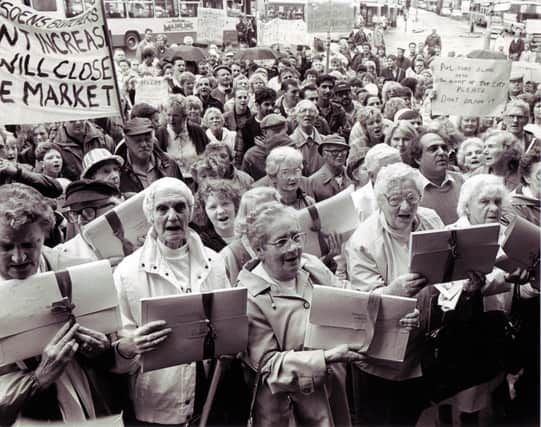Sheffield Retro column: Monica Dyson doesn't want to be called a pensioner


One of the worst is the way they tag on ‘pensioner’ to people of a certain age, together with the age.
I’m sure this newspaper isn’t guilty of such things!
It’s bad enough being old without it being confirmed, especially when you often look at the photograph of them and think ‘Crikey, she’s 10 years younger than me!’
Advertisement
Hide AdAdvertisement
Hide AdIt often seems that we are the generation that gets called the most names, printable ones at that .
We are officially a pensioner, but we can be a senior citizen, old timer, old fogey, old codger or even old fart, although that is usually in the case of men!
We were once called old age pensioners but that was phased out some time ago and is not now considered politically correct – especially as we are often told that 60 is now the new 40, no doubt thought up by someone many years away from being 60.
In America you could be called oldster, senior, retiree, elder or veteran.
Advertisement
Hide AdAdvertisement
Hide AdI don’t think young people today will use the terms which have been traditional with previous generations.
It was not uncommon for men to refer to their wives not only as ‘our old lass’ but also ‘the wife’ ‘the missus’ ‘the other half’ or even ‘her indoors’ which was an expression used in the television programme Minder by wide boy Arthur Daley.
Although his version certainly could not be called a Yorkshire colloquialism, there was a local dialect play by t’owd Tup of Eckington in the 1960s which included the phrase “Here comes me and our old lass, short of money and short of brass”.
Although money and brass were actually the same thing certainly in the North!
Advertisement
Hide AdAdvertisement
Hide AdMen have referred to their wives as ‘our Gert’, an expression originating from the Midlands, with ‘my trouble and strife’ being Cockney rhyming slang for wife.
A friend of my father’s called his wife ‘my old Dutch’ which came from a 1892 music hall song by Albert Chevalier, and which even today can bring a tear to your eyes!
‘We’ve been together now for 40 years and it don’t seem a day too much,
Oh, there ain’t a lady living in the land that I’d swap for my dear old Dutch!’
Gosh, they don’t write them like that any more.
Advertisement
Hide AdAdvertisement
Hide AdMen haven’t been exempted from descriptions, with women referring to ‘our old fella’ ‘my hubby’ or ‘my better half’ – although that one can be open to debate.
Whatever sex you are, you can be a ‘twirlie’ once you’ve got your bus pass.
That was a phrase coined by Liverpool bus crews who were faced daily with pensioners arriving at the bus stop minutes before the official time of free boarding, saying “Are we too early?”
It then became a joke at our expense, although we enjoyed the last laugh with free travel.
Advertisement
Hide AdAdvertisement
Hide Ad‘Our nip’ or ‘nipper’ or ‘our kid’ were always younger siblings, and we always knew who ‘our mam’ was!
Men have often referred to women by dreadful expressions like ‘birds’ or ‘bimbos’.
Although we fought back by asking if, as birds, did we catch worms?
Now that pensioners are supposed to be cushioned by pensions and a better quality of life, we have often become subjected to acronyms like SWELLS – Sixty, Well off and Enjoying Life, or SKIS – Spending the Kids’ Inheritance.
Advertisement
Hide AdAdvertisement
Hide AdNot that we are spending much of that inheritance at the moment. Except on food !
It has been said that names given to older people are a careless use of language and can be a form of discrimination.
There are over a quarter of a million words in the English language and the over-60s age group are the fastest-growing demographic.
Should we use archaic labels? Or demand more respectful labels?
Advertisement
Hide AdAdvertisement
Hide AdAfter all, statistics show that our country is now officially a ‘grey nation’ with ‘grey power’ and a voice to be heard.
At the end of the day, does it really matter?
Recent events have made us realise what is really important, and I think we are all grateful to be getting through each day unscathed.
I don’t really mind being called a pensioner.
I just do not want to be thought of as a clone of every other retired person but as an individual.
Not that I like being called ‘old’, as I do think that is a term to denote someone elderly, frail, decrepit or over the hill. Chronological age should not be assumed to imply incapability.
Advertisement
Hide AdAdvertisement
Hide AdI read about a retirement complex in Miami where the residents protested about the name which was Leisure Ville.
They said it sounded too much like a retirement complex, although they were all actually retired, and that it suggested that they were all old people who had nothing better to do than sit around all day.
Far from it , they said. “We are too busy with classes, going to the gym, writing our memoirs and playing tennis!”
Of course, there are many older people who have become incapable of coping with advancing years because of illness, physical infirmity or the restrictions placed on their lives by loneliness or poverty.
Advertisement
Hide AdAdvertisement
Hide AdBut defining us by age should really be as unacceptable as by gender, race, colour or creed!
Thank you to all who support local journalism with a digital or print subscription to The Star. The events of 2020 mean trusted, local journalism is more reliant than ever on your support. We couldn't do it without you. Subscribe here www.thestar.co.uk/subscriptions so we can keep campaigning on your behalf. Stay safe.